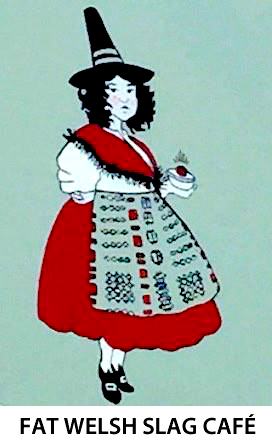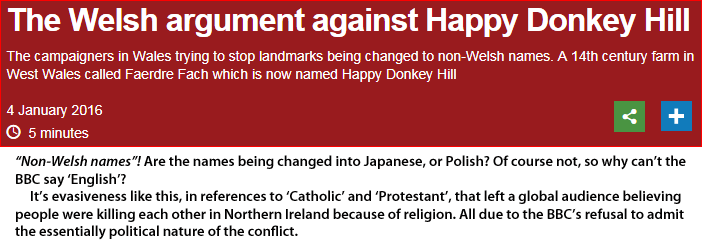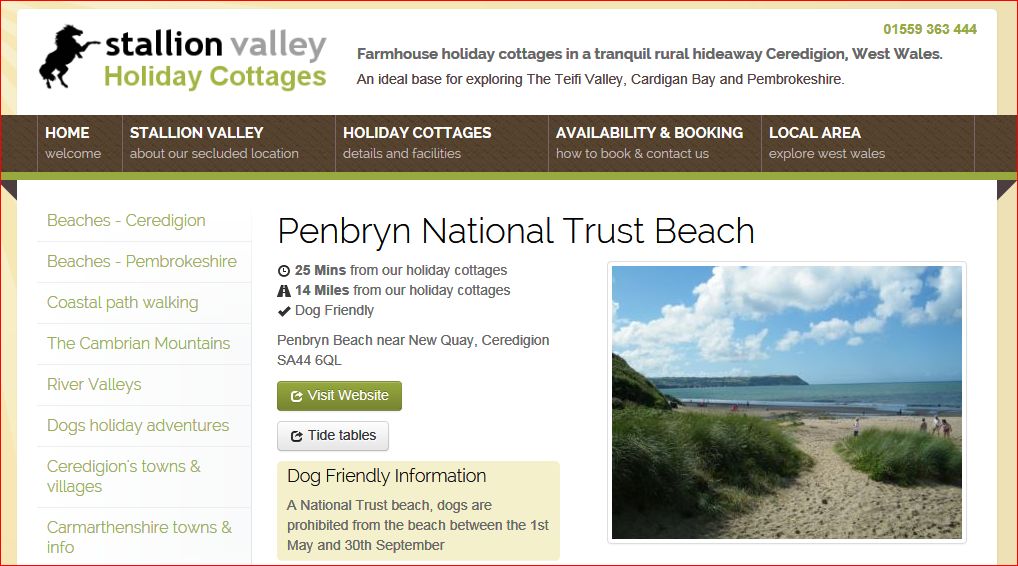Happy Donkey Hill has been back in the news. Or rather, it made it onto the Today programme on BBC Radio 4 on Monday. (Click here and go to 1:22:32.) Then Kate Clamp popped up on Wales Today. And here’s another  piece from the BBC in which we hear from her again, and also a spokesman for Mynyddoedd Pawb . . . being rather ambivalent, I thought. He “completely understands” why people should want to change names and doesn’t want to “over-romanticise” the past!
piece from the BBC in which we hear from her again, and also a spokesman for Mynyddoedd Pawb . . . being rather ambivalent, I thought. He “completely understands” why people should want to change names and doesn’t want to “over-romanticise” the past!
In fact the spokesman for Mynyddoedd Pawb (whose name I didn’t catch) seemed to display all the symptoms of seimonglynphobia, or a mortal fear of saying too much and offending anyone. A condition perhaps best compared to expressing a desire to tackle flooding while simultaneously denying that an excess of water might be the problem.
On the principle that there’s no such thing as bad publicity, and seeing as the vast majority of those listening to Today would have been English, Kate Clamp is probably delighted with such coverage.
Even the company that made what she wore for her 15 minutes of infamy, Robinsons Equestrian clothing, got involved by tweeting, “Nice surprise to see one our Requisite garments on BBC TV earlier. Thanks @happydonkeyhill!” I chipped in with, “Being associated with colonialist bigots must do wonders for your image.” Then there was a bit of banter with Clamp herself who opined that I should be ignored as my head is so far up my ares (sic) that Google couldn’t find it. (Ah, the wit!) In another tweet she called me “hideous” – moi! Eventually she sent me a DM in which she called me a very, very naughty name. At this point I decided, very reluctantly, and only to spare my blushes, that she had to be blocked.
*
Another example brought to my attention of a name being changed from Welsh to “non-Welsh” is over on the border (the ‘Welsh border’, of course) near Hay-on-Wye. There the Maesllwch Arms, a listed coaching inn, was recently re-named Foyles.
This change was explained thus, “Taking pride in the literary history of the area, and the nearby town of books, Hay on Wye, Foyles (the former Maesllwch Arms) has been named after the famous chain of bookshops.” What ‘literary history’? As for Hay, it’s claim to fame is that a megalomaniac imposed himself on the town and took it over with second-hand bookshops, eventually declaring himself ‘king’, and Hay independent. All good fun and guaranteed to appeal to those who succumb to the myth of the ‘great English eccentric’.
The real problem with ‘Foyles’ though is not just that the owners decided Maesllwch was too Welsh, and that the name of an English book chain with no local links was an improvement, but that the ‘Welsh’ Government agreed, coughing up £150,000 of our money in a grant to ‘Foyles’.
So my message to those believing that an appeal to the quisling puppet show in Cardiff docks will do something to stop this insidious form of colonialism is simple – you’ll be wasting your time.
*
The next example I want to use takes us to Ceredigion, and land owned by the English National Trust. One of the less-frequented beaches along that over-developed stretch of coast is to be found at Penbryn beach, between Tresaith and Llangrannog.
Perhaps not so well known to tourists, Penbryn beach was always popular with locals, youngsters especially. It was where they went for parties and barbecues. The lucky ones would get summer jobs at the cafe at the top of the quiet road leading down to the beach. A cafe called ‘Cartws’ (‘cart house’) run by a local, Welsh-speaking family.

That was then, now it’s been taken over by a couple from London and re-named ‘The Plwmp Tart’. (Plwmp is a hamlet not far away on the A487 trunk road.) The Plwmp Tart is obviously someone’s idea of humour, a play on the various meanings of the word tart. On the one hand it’s a pastry dish, on the other it’s a vulgar and sexually provocative woman.
is obviously someone’s idea of humour, a play on the various meanings of the word tart. On the one hand it’s a pastry dish, on the other it’s a vulgar and sexually provocative woman.
Seeing as this is a cafe it must surely be a reference to the pastry delicacy. Well, in that case, why use the image of a woman in traditional Welsh dress? And seeing as that is the image used (rather than any pastry dish) anyone seeing the sign is invited to imagine a fat Welsh scrubber from Plwmp. (Lesson 1 in ‘How to Make Friends With Your New Welsh Neighbours’ – Despite it being an English tradition, don’t make slanderous insinuations about the sexual behaviour of Welsh women.)
What we have here is not simply a change of name from Welsh to “non-Welsh”, but an added insult with the clear inference that Welsh women are lax in their sexual morals. A real echo of traditional colonialism, for ‘easy’ local women was one of the perks every young soldier in Victoria’s army expected from an overseas posting.
*
Finally, while Googling ‘Penbryn beach’ I came across another example of the problem in ‘Stallion Valley Holiday Cottages’. The traditional name is of course ‘Cwm March’. The cottages themselves are called ‘The Farmhouse’, ‘The Mill’ and ‘The Byre’.
No doubt the owner of ‘Stallion Valley’ would defend him/herself by arguing that the official name remains Cwm March, and that Stallion Valley is simply used for trading purposes, done, as Kate Clamp argued, because people – i.e. English people – can’t remember or pronounce the name Cwm March. Bollocks. Even it comes out as ‘Comb Mark’ that’s still better than callously throwing away a thousand years or more of someone else’s culture and identity.
You will have noted that the common denominator or link to all these cases is tourism. Tourism and the invasion it encourages. The tourism that is creating a country from which genuine Welshness has been hollowed out to leave a socially-engineered nightmare free of anything that could remind English tourists they are in another country.
Wake up, folks. This is what colonialist tourism is doing to Wales. And the truth is that our masters always intended that tourism should have this effect on Wales.
END
NEXT: Carmarthenshire County Council and the vendetta against Clive Hughes



